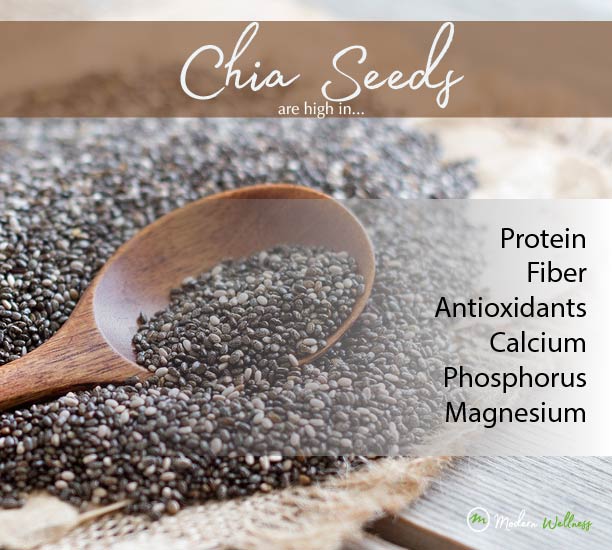Chia Seed

Chia seeds are tiny black seeds from a plant that originated in South America. In fact, “chia” is the ancient Mayan word for “strength.” According to Dr. Oz, chia seeds are among the healthiest foods on the planet. They are loaded with nutrients that are necessary for the body and brain.
Chia seeds are loaded with fiber. Because of the high fiber content, chia seeds can absorb up to 10-12 times their weight in water, becoming gel-like and expanding in the stomach. This should increase fullness, slow the absorption of food and help you eat fewer calories. Adding some chia to your diet is an easy way to make sure you’re getting a good amount of fiber, which is important for digestive health, blood sugar (fiber doesn’t raise blood sugar!), and weight control.
Chia seeds contain protein. Protein has many health benefits. It is the most diet-friendly nutrient and has been proven to affect weight.
So, since we’ve mentioned fiber and protein and their effects on weight and digestive health, it is necessary to further understand how this benefits the diabetic population. Remember that we said fiber doesn’t raise blood sugar? That’s a huge plus for diabetics. Chia is being currently studied as a potential natural treatment for type-2 diabetes because of its ability to slow down digestion and to prevent blood sugar spikes.
In this study, 20 diabetic patients received either 37 grams of chia seeds, or 37 grams of wheat bran, for 12 weeks. Several improvements in certain health markers have been noted. Blood pressure and blood sugar decreased and an inflammatory marker called hs-CRP went down by 40%. A risk factor called vWF also decreased by 21%. This is good news for those living with diabetes!
Chia seeds also have a high amount of antioxidants. Antioxidants fight the production of free radicals, which can damage cells and contribute to aging and diseases like cancer.
Chia seeds are high in several nutrients that are important for bone health. These are calcium, phosphorus, magnesium and protein (which we already mentioned). A serving of chia seeds has 18% of the recommended daily allowance for calcium (higher than most dairy products!); necessary for to maintaining bone and oral health and preventing osteoporosis. Phosphorus is a nutrient that is used by the body to synthesize protein for cell and tissue growth and repair. Chia seeds are a great option for those who are lactose-intolerant or who just don’t like dairy products.
Chia seeds are a natural, whole-grain food. They are usually grown organically, are non-GMO and are free of gluten. Adding chia seeds to recipes will dramatically boost the nutritional value. Why would you not add chia seeds to your diet? They are easy to incorporate into your diet because they don’t need to be ground beforehand (unless you want to). Try these ways of using chia seeds:
- They can be eaten raw, soaked in juice, added to oatmeal and pudding, or added to baked goods.
- Chia seeds can be sprinkled on top of cereal, yogurt, vegetables or rice dishes.
- Because of their ability to absorb both water and fat, they can be used to thicken sauces and even used as egg substitutes in recipes. According to Wellness Mama: To substitute for an egg: Use 1 tablespoon finely ground chia seeds (grind them dry in a blender, food processor, or coffee grinder) and 3 tablespoons of water per egg in a baked recipe (does not work in place of eggs for omelets though…)
- They can also be mixed with water and turned into a gel.
- Chia pudding- http://www.skinnytaste.com/2013/05/superfood-triple-berry-chia-pudding.html
I’d love to hear how you use chia seeds in your diet! I sprinkle mine over salad or in a smoothie.
Take care and be well!

You must be logged in to post a comment.